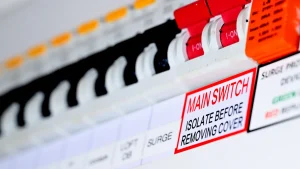
You’ve more than likely noticed a lot more EVs on the road than even a year ago, and that number continues to rise.
With electric vehicle adoption surging across the UK and government regulations tightening, businesses can no longer afford to stay on the sidelines. Whether you’re managing a retail park or running a logistics fleet, workplace EV chargers are quickly shifting from a nice-to-have to a must-have.
Struggling to keep up with changing expectations? This guide shows how businesses can prepare for the EV revolution, minimising disruption while maximising returns. And from planning to EV installation, Mission Road Electrical provides tailored solutions to keep you ahead of the curve.
The rise in electric vehicles isn’t just a trend – it’s a shift in how the UK powers transport. Businesses that adapt now stand to gain significantly.
Supporting staff and customers who drive electric vehicles (EVs) is no longer optional, as EV charging for businesses can improve employee satisfaction, encourage repeat custom and attract tenants or visitors.
It also plays a vital role in meeting sustainability and net zero targets, something increasingly scrutinised by regulators and stakeholders.
Plus, installing EV charger infrastructure also signals your company is forward-thinking and eco-conscious, enhancing your brand image and appeal to talent and clients alike. Through smart systems, you can also unlock cost savings, especially by integrating energy-efficient tech and managing peak demand wisely.
Bottom line: Futureproofing your business today means you’re not racing to catch up tomorrow. With the right EV charger installation for businesses, you stay compliant, competitive and ready for the long haul, while offering clear benefits to staff and customers.
Now that we’ve established why EV matters, let’s look at factors to consider – there are a few – and being aware of them can save you a lot of bother down the line.
When considering installation planning and cost considerations, begin by evaluating where chargers will be most effective. Prioritise areas with regular traffic flow, ease of access and good visibility. And consider proximity to power sources and how the installation might affect your operations.
Your existing electrical infrastructure must be able to handle the additional load. Collaborate with professionals to assess capacity and avoid overloading your system. You may need to liaise with your DNO (Distribution Network Operator) to upgrade your supply.
The right number depends on user demand and dwell time. If vehicles are parked for hours, standard fast chargers may suffice. Where quicker turnaround is needed, rapid chargers are essential. In short, charging speed (fast vs rapid) must align with your business model.
Smart systems monitor and distribute power efficiently. Load management and smart charging help prevent blackouts and reduce energy costs by shifting usage to off-peak hours, keeping operations smooth and energy bills down.
Decide whether the chargers will be exclusive to employees or available to the public. Public access may require integration with payment systems and signage, and restricted access may require authentication solutions.
Lastly, you should make sure you’re planning for growth. To that end, choose systems that can scale as EV usage rises. This futureproofs your investment and reduces the need for major infrastructure changes later.
To learn more about choosing the right EV charger for your site, don’t miss our blog on how to choose the right EV charger for your home or business. It’s packed with practical advice and guidance for every scenario.
At Mission Road Electrical, we take a consultative approach to designing scalable EV infrastructure that fits your needs now and down the road. Whether you’re starting small or rolling out multiple charge points, we build systems that evolve with your business.
Our workplace EV chargers can be integrated with solar PV systems and energy management tools to create a sustainable, efficient energy network. Every installation meets the highest standards for compliance and safety, ensuring minimal disruption to your operations.
And our support doesn’t end after the installation, as our ongoing maintenance and expert advice keep your system running reliably.
One of the key questions we get is “How much does EV charging cost?”. The good news is that UK businesses may not need to shoulder the full expense.
Under the OZEV Workplace Charging Scheme, eligible businesses can claim up to 75% of purchase and installation costs for workplace EV charge points. That works out up to £350 per socket, for as many as 40 sockets, equalling a potential grant of up to £14,000 per applicant.
The scheme has recently been extended, with the deadline for applications now extended to the 31st of March 2026.
Mission Road can help you navigate the process, identify funding opportunities and handle the paperwork, so you don’t leave money on the table when investing in business electric vehicle charging.
So, why should you choose us? Because we’re not just installers – we’re your long-term partners in sustainable, future-ready infrastructure.
Here’s why businesses across Southern England trust us:
Whatever your sustainability goals, you can trust Mission Road Electrical to provide you with fully compliant, industry-leading solutions.
The future is electric and knowing how businesses can prepare for the EV revolution is key to staying competitive. Take the first step today by booking your free site assessment or initial consultation.
Call 01202 283643 or use our contact form to get started. Whether you’re exploring workplace EV chargers or need guidance on meeting your net zero targets, Mission Road Electrical offers scalable systems, certified workmanship, and expert planning support to power your transition with confidence.

